人教版八年级上册Unit1 Where did you go on vacation? 重点单词、短语、句型、语法讲解(无答案)
文档属性
| 名称 | 人教版八年级上册Unit1 Where did you go on vacation? 重点单词、短语、句型、语法讲解(无答案) |
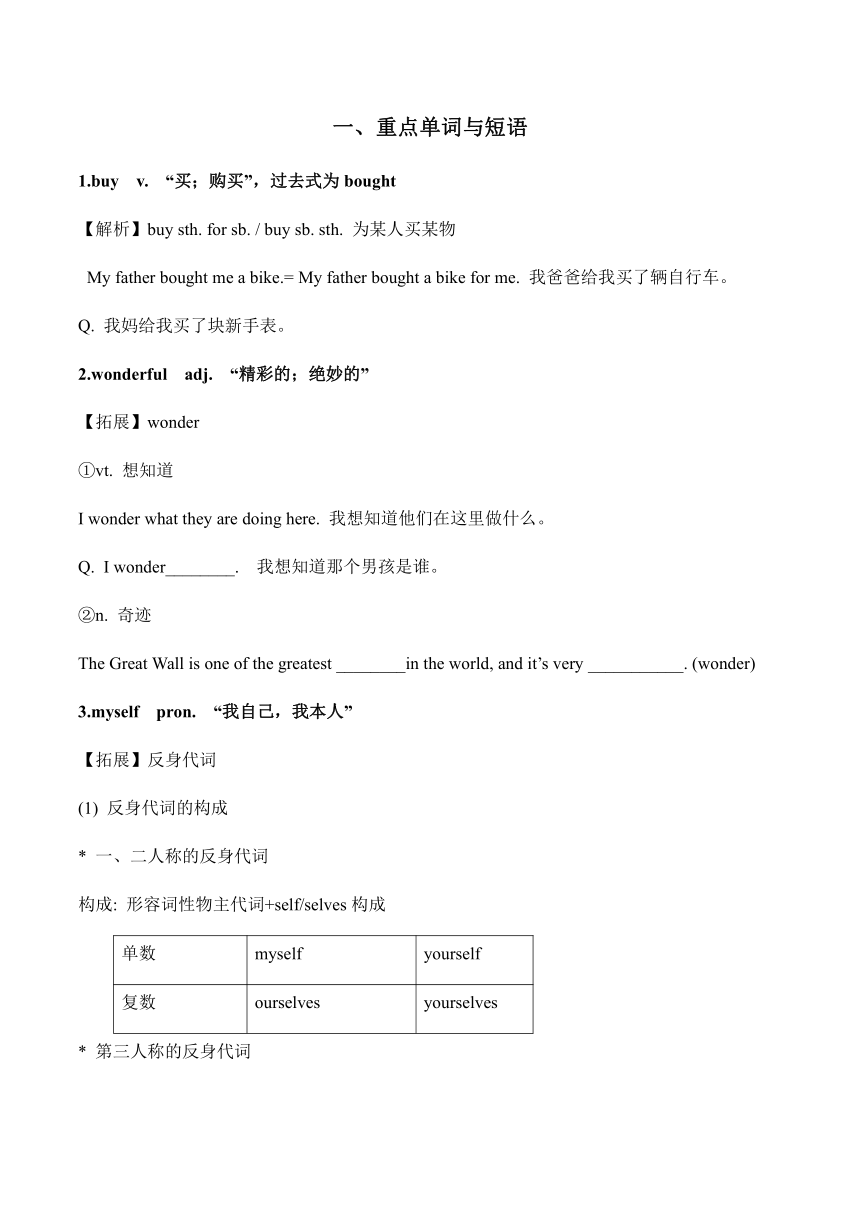
|
|
| 格式 | zip | ||
| 文件大小 | 35.1KB | ||
| 资源类型 | 教案 | ||
| 版本资源 | 人教新目标(Go for it)版 | ||
| 科目 | 英语 | ||
| 更新时间 | 2020-08-12 23:22:44 | ||
图片预览

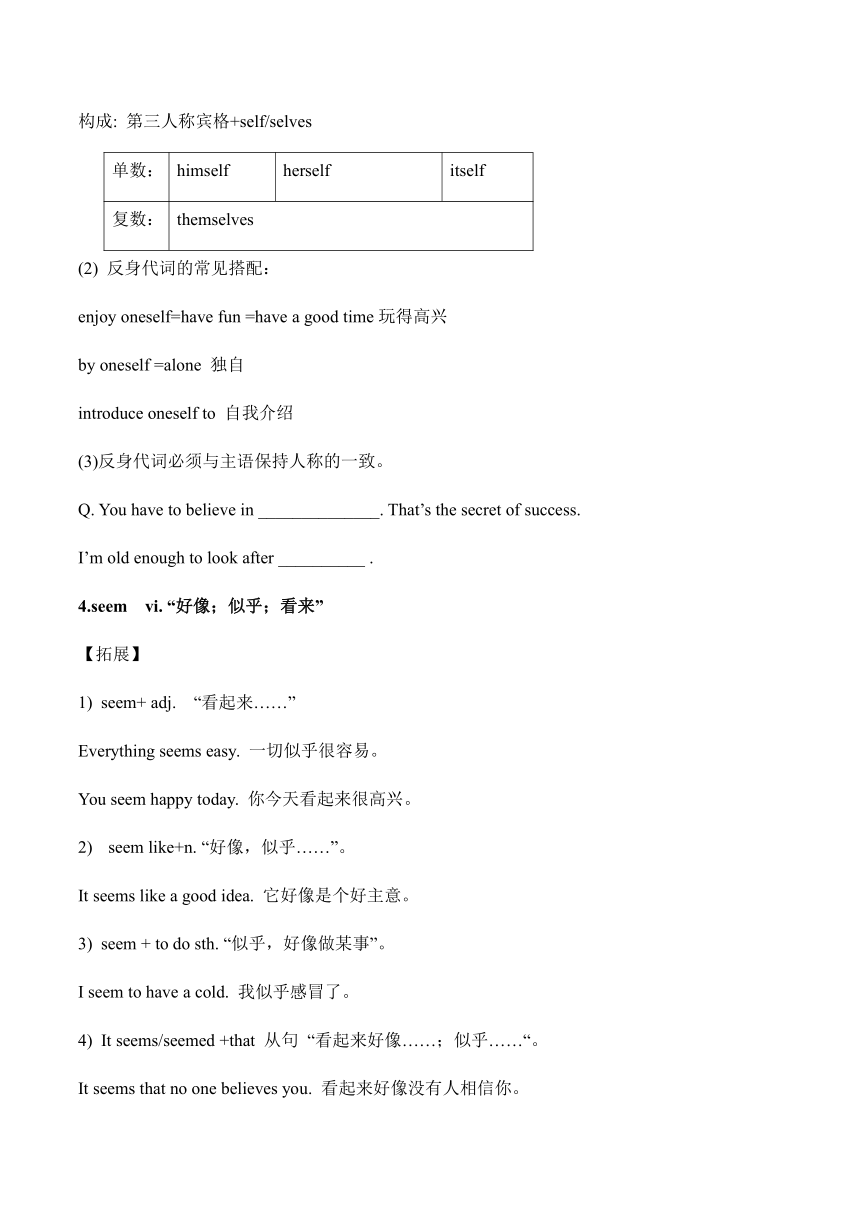
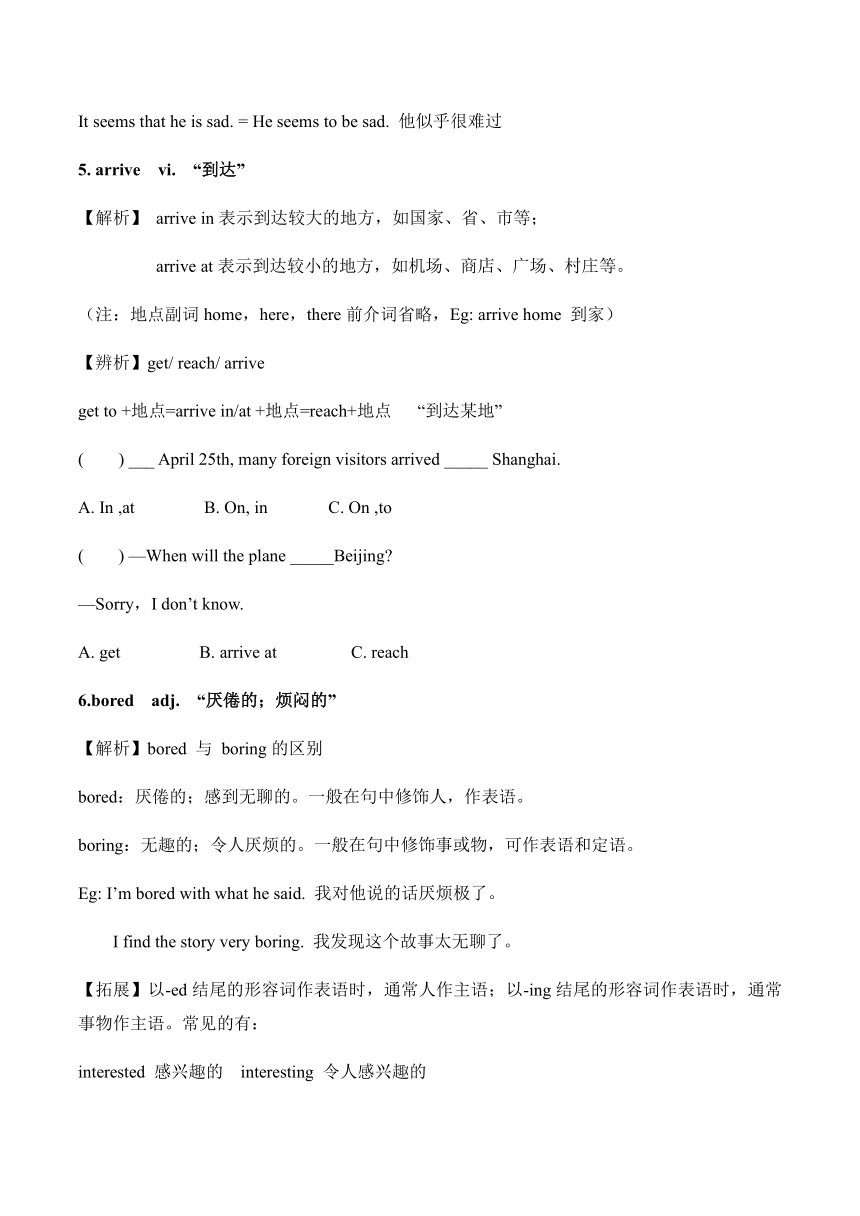
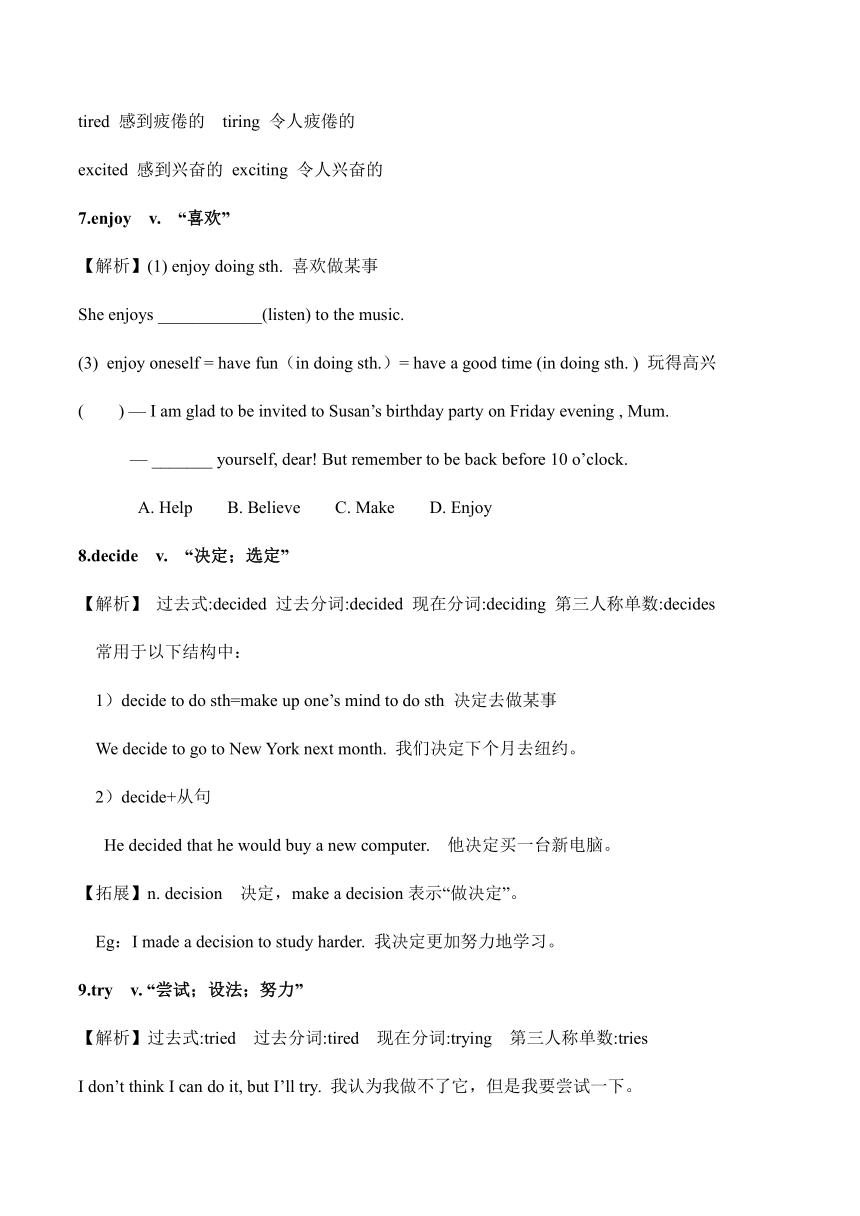
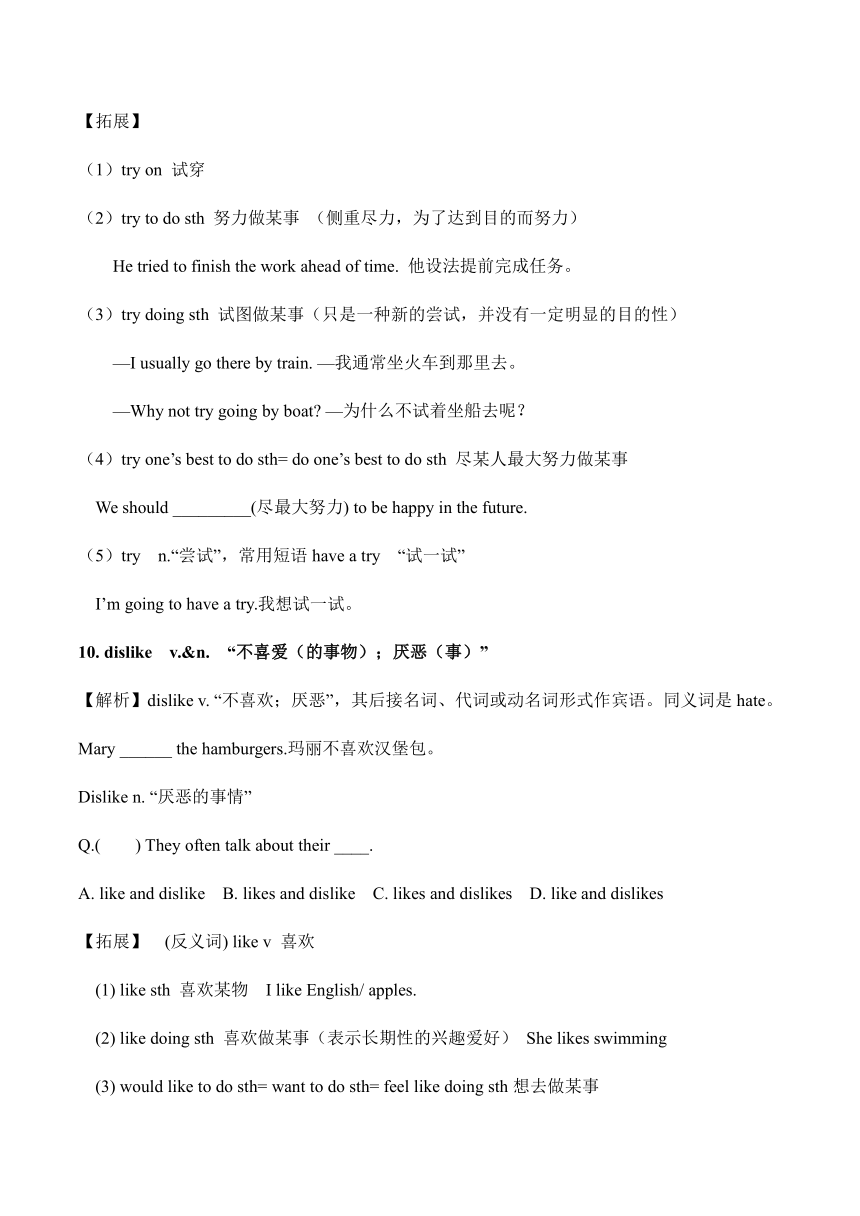
文档简介
一、重点单词与短语
1.buy
v.
“买;购买”,过去式为bought
【解析】buy
sth.
for
sb.
/
buy
sb.
sth.
为某人买某物
My
father
bought
me
a
bike.=
My
father
bought
a
bike
for
me.
我爸爸给我买了辆自行车。
我妈给我买了块新手表。
2.wonderful
adj.
“精彩的;绝妙的”
【拓展】wonder
①vt.
想知道
I
wonder
what
they
are
doing
here.
我想知道他们在这里做什么。
I
wonder________.
我想知道那个男孩是谁。
②n.
奇迹
The
Great
Wall
is
one
of
the
greatest
________in
the
world,
and
it’s
very
___________.
(wonder)
3.myself
pron.
“我自己,我本人”
【拓展】反身代词
反身代词的构成
一、二人称的反身代词
构成:
形容词性物主代词+self/selves构成
单数
myself
yourself
复数
ourselves
yourselves
第三人称的反身代词
构成:
第三人称宾格+self/selves
单数:
himself
herself
itself
复数:
themselves
反身代词的常见搭配:
enjoy
oneself=have
fun
=have
a
good
time玩得高兴
by
oneself
=alone
独自
introduce
oneself
to
自我介绍
(3)反身代词必须与主语保持人称的一致。
Q.
You
have
to
believe
in
______________.
That’s
the
secret
of
success.
I’m
old
enough
to
look
after
__________
.
4.seem
vi.
“好像;似乎;看来”
【拓展】
seem+
adj.
“看起来……”
Everything
seems
easy.
一切似乎很容易。
You
seem
happy
today.
你今天看起来很高兴。
seem
like+n.
“好像,似乎……”。
It
seems
like
a
good
idea.
它好像是个好主意。
seem
+
to
do
sth.
“似乎,好像做某事”。
I
seem
to
have
a
cold.
我似乎感冒了。
It
seems/seemed
+that
从句
“看起来好像……;似乎……“。
It
seems
that
no
one
believes
you.
看起来好像没有人相信你。
It
seems
that
he
is
sad.
=
He
seems
to
be
sad.
他似乎很难过
5.
arrive
vi.
“到达”
【解析】
arrive
in表示到达较大的地方,如国家、省、市等;
arrive
at表示到达较小的地方,如机场、商店、广场、村庄等。
(注:地点副词home,here,there前介词省略,Eg:
arrive
home
到家)
【辨析】get/
reach/
arrive
get
to
+地点=arrive
in/at
+地点=reach+地点
“到达某地”
(
)
___
April
25th,
many
foreign
visitors
arrived
_____
Shanghai.
A.
In
,at
B.
On,
in
C.
On
,to
(
)
—When
will
the
plane
_____Beijing?
—Sorry,I
don’t
know.
A.
get
B.
arrive
at
C.
reach
6.bored
adj.
“厌倦的;烦闷的”
【解析】bored
与
boring的区别
bored:厌倦的;感到无聊的。一般在句中修饰人,作表语。
boring:无趣的;令人厌烦的。一般在句中修饰事或物,可作表语和定语。
Eg:
I’m
bored
with
what
he
said.
我对他说的话厌烦极了。
I
find
the
story
very
boring.
我发现这个故事太无聊了。
【拓展】以-ed结尾的形容词作表语时,通常人作主语;以-ing结尾的形容词作表语时,通常事物作主语。常见的有:
interested
感兴趣的
interesting
令人感兴趣的
tired
感到疲倦的
tiring
令人疲倦的
excited
感到兴奋的
exciting
令人兴奋的
7.enjoy
v.
“喜欢”
【解析】(1)
enjoy
doing
sth.
喜欢做某事
She
enjoys
____________(listen)
to
the
music.
enjoy
oneself
=
have
fun(in
doing
sth.)=
have
a
good
time
(in
doing
sth.
)
玩得高兴
(
)
—
I
am
glad
to
be
invited
to
Susan’s
birthday
party
on
Friday
evening
,
Mum.
—
_______
yourself,
dear!
But
remember
to
be
back
before
10
o’clock.
A.
Help
B.
Believe
C.
Make
D.
Enjoy
8.decide
v.
“决定;选定”
【解析】
过去式:decided
过去分词:decided
现在分词:deciding
第三人称单数:decides
常用于以下结构中:
1)decide
to
do
sth=make
up
one’s
mind
to
do
sth
决定去做某事
We
decide
to
go
to
New
York
next
month.
我们决定下个月去纽约。
2)decide+从句
He
decided
that
he
would
buy
a
new
computer.
他决定买一台新电脑。
【拓展】n.
decision
决定,make
a
decision表示“做决定”。
Eg:I
made
a
decision
to
study
harder.
我决定更加努力地学习。
9.try
v.
“尝试;设法;努力”
【解析】过去式:tried
过去分词:tired
现在分词:trying
第三人称单数:tries
I
don’t
think
I
can
do
it,
but
I’ll
try.
我认为我做不了它,但是我要尝试一下。
【拓展】
try
on
试穿
try
to
do
sth
努力做某事
(侧重尽力,为了达到目的而努力)
He
tried
to
finish
the
work
ahead
of
time.
他设法提前完成任务。
try
doing
sth
试图做某事(只是一种新的尝试,并没有一定明显的目的性)
—I
usually
go
there
by
train.
—我通常坐火车到那里去。
—Why
not
try
going
by
boat?
—为什么不试着坐船去呢?
(4)try
one’s
best
to
do
sth=
do
one’s
best
to
do
sth
尽某人最大努力做某事
We
should
_________(尽最大努力)
to
be
happy
in
the
future.
(5)try
n.“尝试”,常用短语have
a
try
“试一试”
I’m
going
to
have
a
try.我想试一试。
10.
dislike
v.&n.
“不喜爱(的事物);厌恶(事)”
【解析】dislike
v.
“不喜欢;厌恶”,其后接名词、代词或动名词形式作宾语。同义词是hate。
Mary
______
the
hamburgers.玛丽不喜欢汉堡包。
Dislike
n.
“厌恶的事情”
Q.(
)
They
often
talk
about
their
____.
A.
like
and
dislike
B.
likes
and
dislike
C.
likes
and
dislikes
D.
like
and
dislikes
【拓展】
(反义词)
like
v
喜欢
(1)
like
sth
喜欢某物
I
like
English/
apples.
(2)
like
doing
sth
喜欢做某事(表示长期性的兴趣爱好)
She
likes
swimming
(3)
would
like
to
do
sth=
want
to
do
sth=
feel
like
doing
sth想去做某事
Q:①I
________
her
because
she
always
argues
with
me
.
(like)
②
(
)—
Would
you
like
_____
shopping
with
me?
—
Sorry,
I
feel
like
____
this
book.
A.
to
go;
read
B.
to
go;
reading
C.
going;
to
read
D.
going;
reading
11.difference
n.
“差别;差异”
【解析】
different
adj.
不同的
→differently
adv.
不同地→difference
n.
不同点
be
different
from=
be
not
the
same
as
与…..不同
(反)
the
same
as
“和...一样”
make
a/the
difference表示“要紧,起作用,有所不同”,
Does
his
absence
make
a
difference
to
your
work?
假如没有他,对你的工作会有影响吗?
12.wait
v.
“等待;等候”
【解析】wait
v
等待→
waiter
n
(男)服务员
1)wait
for意为“等候”,其后接内容。
a.I’ll
wait
for
you
at
the
door.
b.Tom
was
waiting
for
a
bus
over
there.
2)wait
to
do
sth
等待做某事
The
longer
you
wait
to
do
something,
the
more
difficult
it
will
be
to
get
it
done.
3)can’t
wait
to
do
sth
迫不及待的做某事
I
can’t
wait
to
see
you
again.
Q.
—You're
in
a
hurry.
Where
are
you
going???
—To
the
cinema.
Tom
____
for
me
outside.
?
A.
waits??B.??waited
C.
is
waiting?
?D.was
waiting
13.enough
adj.&
adv.
“足够的(地),充足的(地)”
【解析】
(1)adj.
足够的,修饰可数名词或不可数名词,可以放在名词前面,也可以放在名词后面;
enough+
n.
+to
do
sth.
Eg:
We
still
have
enough
time
to
make
this
birthday
cake
look
good
enough.
(2)
adv.
足够地,修饰形容词、副词、动词,并放在其后。
serious
enough
足够严肃
She
has
enough
money,
and
is
also
beautiful
enough.
Q.This
movie
wasn’t
______.
He
fell
asleep
half
way
through
it.
A.
interesting
enough
B.
enough
interesting
C.
interested
enough
D.
enough
interested
(3)
not
enough
to
do
sth.(不够...去做某事)与too...to...(太...而不能),
so...that...(如此...以致于)句型转换
Eg:
He
is
not
old
enough
to
go
to
school.
=He
is
too
young
to
go
to
school.
=He
is
so
young
that
he
can’t
go
to
school.
Q.He
is
old
enough
to
go
to
school.=
He
is
___
____
that
he
can
go
to
school.
She
was
so
weak
that
she
can’t
take
good
care
of
her
children.=
She
was
___
weak
___take
care
of
her
children.
14.forget
v
“忘记”
【解析】forget的反义词remember“想起;记得”
forgetful意为“健忘的”
【辨析】forget
to
do
sth.与forget
doing
sth.
(1)forget
to
do
sth.意为“忘记要做某事(事情还没做)
Don’t
forget
to
close
the
window.
(2)forget
doing
sth.意为“忘记做过某事(事情已经做过了)
I
forget
closing
the
window.
【拓展】remember
to
do“_______________”;
remember
doing“_______________”。
15.stay
at
home
“待在家里”
【解析】stay
at
home=
be
at
home
Stay
in/at
+地点
Stay
+形容词
“保持...的状态”
Eg:
Stay
hungry,
stay
foolish.
16.quite
a
few
“相当多”
【辨析】quite
a
few与quite
a
little
quite
a
few意为“相当多;不少”,修饰可数名词复数;=many
quite
a
little意为“相当多;不少”,修饰不可数名词。=much
①He
will
stay
here
for
_____
_____
_____days.
②There
is
_____
_____
_____water
in
the
bottle.
【拓展】
few
/
a
few
little
/
a
little辨析
否定
肯定
所修饰的名词
few没有,几乎没有
a
few有几个
可数名词复数
little几乎没有。
a
little有一点儿
不可数名词
1)few
/
a
few用来修饰可数名词,
①few表示否定,“没有,几乎没有”
He
has
few
friends
here,
he
feels
lonely.
他这里没朋友,他感觉寂寞。
②a
few表示肯定,“有几个”
There
are
a
few
eggs
in
the
basket.
篮子里有几个鸡蛋。
2)little
/
a
little用来修饰不可数名词,
①little表示否定,“没有,几乎没有”。
There
is
little
time
left.
Hurry
up!
没多少时间了,快点儿!
②a
little
表示肯定,“有一点儿”
—Can
you
speak
English?
—Yes,
but
only
a
little.
In
our
school,
____
students
like
English,
but
_____
of
them
can
speak
English
smoothly.
A.
a
little,
a
few
B.
a
few,
few
C.
a
few,
little
D.
a
little,
few
John?is?getting?very?thin.?He?doesn't?eat?_____?food.??
A.?many?
B.?enough?
C.?few?
D.?little?
Now
teenagers
are
very
busy
with
their
schoolwork
and
they
have
_____
time
to
do
exercise.
few
B.
little
C.
a
few
D.
a
little
17.because
of
“因为”
【辨析】because
of与because
(1)
because
of介词短语,“因为,由于”,后可接名词、代词或动名词,不能接句子。
She’s
worried
because
of
her
son.
(2)
because连词,“因为”,引导状语从句,表示直接明确的原因或理由。
He
didn’t
go
to
school
yesterday
because
he
was
ill.
I
didn’t
go
to
the
party
not
____
the
weather
but
____
I
didn’t
feel
well.
A.
because
of;
because
B.
because
;
because
of
C.
because
;
because
(3)
because
还可以回答why
引导的句子(because
是连词,后接句子,是主句的直接原因,常用来回答由why
引导的特殊疑问句。)
—
Why
do
you
like
pandas?
—
Because
they
are
cute.
(4)
because
和so
不能一起连用,二者只能用其一。
Tom
didn’t
go
to
school
yesterday
____
he
was
ill.
A.
as
B.
so
C.
because
D.
while
Mo
Yan’s
books
have
been
sold
out
in
many
book
stores
___
his
winning
of
the
Nobel
Literature
Prize.
because
B.
since
C.
as
D.
because
of
二、重点句型
1.
How
did
you
like
it?
你觉得它怎么样?
【解析】
How
do
you
like
sth?=
What
do
you
think
of
sth?
或者“How
do
you
feel
about…..?”,你认为......怎么样?
—
It’s/
they’re
...
—
I
love/
like...
—
I
don’t
mind...
—
I
can’t
stand
...
It
was
my
first
time
there.
这是我第一次去那里。
【解析】It’s
one’s
first
time
to
do
sth
.
某人第一次做某事
Q.
翻译:这是我第一次看电影。
3
.Why
not?
为什么不?
【解析】why
not意为“为什么不呢”,一般用在疑问句中,表示提建议;why
not后面需跟动词原形。
【注】“Why
not
+
动词原形?”
相当于“Why
don’t
you+
动词原形?”
a.Why
not
go
to
the
party
with
me?
=Why
don’t
you
go
to
the
party
with
me?为什么不和我一起去参加聚会呢?
b._____
_____take
a
walk?
=
_____
______
_____
take
a
walk?
为什么不去散步呢?
4.
What
a
difference
a
day
makes!
多么与众不同的一天啊!
【解析】感叹句句型结构:
(1)
what
修饰名词,引导的感叹句的形式:
What
+
(a/
an
)
+
形容词
+
名词
+
(主语
+
谓语)!
Eg.
What
a
beautiful
park(
it
is)!
这是一个多么漂亮的公园啊!
What
nice
weather!
多么好的天气!
What
lovely
dogs
they
are!
多么可爱的一群小狗啊!
(2)
how
修饰形容词或副词,引导感叹句的形式:
①How
+形容词或副词+主语+谓语!
Eg.How
wonderful
the
waterfall
looks!
瀑布看起来多壮观啊!
②How+形容词+a/an+可数名词单数+主语+谓语!
How
beautiful
a
place
it
is!
多美的一个地方啊!
③How+主语+谓语!
How
time
flies!
光阴似箭!
Q.翻译:那本书多么有趣啊
____
delicious
the
dish
is!
What
B.
How
C.
What
a
____
strange
clothes
he
is
wearing!
A.
What
a
B.
What
C.
How
a
____
interesting
subject
it
is!
A.
What
B.
How
C.
What
an
____
foggy
it
was
yesterday!
A.
What
B.
What
a
C.
How
____
careless
a
boy
you
are!
A.
How
B.
What
a
C.
What
三、重点语法
一般过去时
定义
一般过去时表示过去某个时间发生的动作或存在的状态,也可表示过去经常或反复发生的动作。常和表示过去的时间状语连用,如yesterday,
last
week,
last
night,
in
2003,
two
days
ago等。
I
got
up
at
6:30
yesterday.
我昨天6:30起床。
My
father
was
very
busy
last
week.
我父亲上周很忙。
基本结构
1.
肯定句“主语+动词过去式+其他”或者“主语+was/were+其他”。
I
played
tennis
last
weekend.
我上周末打网球了。
My
school
trip
was
great.
我的学校郊游棒极了。
2.
否定句“主语+didn’t+动词原形+其他”或“主语+wasn’t/weren’t+其他”。
The
girl
didn’t
play
computer
games
yesterday
afternoon.
这个女孩昨天下午没玩电子游戏。
Old
Henry
wasn’t
happy
last
Friday.
上星期五老亨利不高兴。
3.
一般疑问句“Did+主语+动词原形+其他?”肯定回答为“Yes,主语+did”,否定回答为
“No,主语+didn’t”或者“Was/Were+主语+其他?”肯定回答为“Yes,主语+was/were”,
否定回答为“No,主语+wasn’t/weren’t”。
—
Did
you
go
to
the
beach?
你们去海滩了吗?
—
Yes,
we
did./No,
we
didn’t.
是的,我们去了。/不,我们没有。
—
Was
your
weekend
OK?
你的周末过得还行吧?
—
Yes,
it
was./No,
it
wasn’t.
是的,还行。/不,不行。
4.
特殊疑问句:特殊疑问词+一般疑问句(顺序)?
—
What
did
Li
Lei
do
last
weekend?
李雷上周末干什么了?
—
He
visited
his
grandparents.
他去看了他的祖父母。
—
Where
were
you
yesterday?
你昨天在哪儿?
—
I
was
at
home.
我在家里。
复合不定代词的构成及用法
构成:由some,
any,
no,
every分别加上-body,
-thing,
-one构成的不定代词叫做复合不定代词;加上-where构成副词。
?
some-
any-
no-
every-
指人
someone
有人
somebody
anyone
任何人
anybody
no
one
没有人
nobody
everyone
人人
everybody
指物
something
某物
anything
任何事
nothing
没有事
everything
一切事
指地点
somewhere
某地
anywhere
任何地方
nowhere
无处,没有地方
everywhere
到处
用法:
(1)不定代词作主语时,谓语动词一般用单数。
There
is
nothing
wrong
with
the
TV.
Everybody
likes
reading.
(2)some-不定代词,通常用于肯定句中;
Someone
is
calling
me.
any-不定代词则多用于否定句、疑问句中。
There
isn’t
anyone
else
there.
Is
anybody
over
there?
但some-可用于表请求、邀请、预料对方会作肯定回答时的疑问句中。
Could
you
give
me
some
money?
Would
you
like
something
to
eat?
anything作“任何事物”,anyone作“任何人”讲时,可用于肯定句,条件句。
I
can
do
anything
for
you.
我可以为你做任何事情。
Anyone
can
do
this.
任何人都能做这件事。
(3)形容词修饰不定代词时,通常要放在不定代词之后。
There
is
something
delicious
on
the
table.
Let's
do
something
interesting.我们做一些有趣的事吧。
I'd
like
something
to
drink.我想要一些喝的东西。
1.buy
v.
“买;购买”,过去式为bought
【解析】buy
sth.
for
sb.
/
buy
sb.
sth.
为某人买某物
My
father
bought
me
a
bike.=
My
father
bought
a
bike
for
me.
我爸爸给我买了辆自行车。
我妈给我买了块新手表。
2.wonderful
adj.
“精彩的;绝妙的”
【拓展】wonder
①vt.
想知道
I
wonder
what
they
are
doing
here.
我想知道他们在这里做什么。
I
wonder________.
我想知道那个男孩是谁。
②n.
奇迹
The
Great
Wall
is
one
of
the
greatest
________in
the
world,
and
it’s
very
___________.
(wonder)
3.myself
pron.
“我自己,我本人”
【拓展】反身代词
反身代词的构成
一、二人称的反身代词
构成:
形容词性物主代词+self/selves构成
单数
myself
yourself
复数
ourselves
yourselves
第三人称的反身代词
构成:
第三人称宾格+self/selves
单数:
himself
herself
itself
复数:
themselves
反身代词的常见搭配:
enjoy
oneself=have
fun
=have
a
good
time玩得高兴
by
oneself
=alone
独自
introduce
oneself
to
自我介绍
(3)反身代词必须与主语保持人称的一致。
Q.
You
have
to
believe
in
______________.
That’s
the
secret
of
success.
I’m
old
enough
to
look
after
__________
.
4.seem
vi.
“好像;似乎;看来”
【拓展】
seem+
adj.
“看起来……”
Everything
seems
easy.
一切似乎很容易。
You
seem
happy
today.
你今天看起来很高兴。
seem
like+n.
“好像,似乎……”。
It
seems
like
a
good
idea.
它好像是个好主意。
seem
+
to
do
sth.
“似乎,好像做某事”。
I
seem
to
have
a
cold.
我似乎感冒了。
It
seems/seemed
+that
从句
“看起来好像……;似乎……“。
It
seems
that
no
one
believes
you.
看起来好像没有人相信你。
It
seems
that
he
is
sad.
=
He
seems
to
be
sad.
他似乎很难过
5.
arrive
vi.
“到达”
【解析】
arrive
in表示到达较大的地方,如国家、省、市等;
arrive
at表示到达较小的地方,如机场、商店、广场、村庄等。
(注:地点副词home,here,there前介词省略,Eg:
arrive
home
到家)
【辨析】get/
reach/
arrive
get
to
+地点=arrive
in/at
+地点=reach+地点
“到达某地”
(
)
___
April
25th,
many
foreign
visitors
arrived
_____
Shanghai.
A.
In
,at
B.
On,
in
C.
On
,to
(
)
—When
will
the
plane
_____Beijing?
—Sorry,I
don’t
know.
A.
get
B.
arrive
at
C.
reach
6.bored
adj.
“厌倦的;烦闷的”
【解析】bored
与
boring的区别
bored:厌倦的;感到无聊的。一般在句中修饰人,作表语。
boring:无趣的;令人厌烦的。一般在句中修饰事或物,可作表语和定语。
Eg:
I’m
bored
with
what
he
said.
我对他说的话厌烦极了。
I
find
the
story
very
boring.
我发现这个故事太无聊了。
【拓展】以-ed结尾的形容词作表语时,通常人作主语;以-ing结尾的形容词作表语时,通常事物作主语。常见的有:
interested
感兴趣的
interesting
令人感兴趣的
tired
感到疲倦的
tiring
令人疲倦的
excited
感到兴奋的
exciting
令人兴奋的
7.enjoy
v.
“喜欢”
【解析】(1)
enjoy
doing
sth.
喜欢做某事
She
enjoys
____________(listen)
to
the
music.
enjoy
oneself
=
have
fun(in
doing
sth.)=
have
a
good
time
(in
doing
sth.
)
玩得高兴
(
)
—
I
am
glad
to
be
invited
to
Susan’s
birthday
party
on
Friday
evening
,
Mum.
—
_______
yourself,
dear!
But
remember
to
be
back
before
10
o’clock.
A.
Help
B.
Believe
C.
Make
D.
Enjoy
8.decide
v.
“决定;选定”
【解析】
过去式:decided
过去分词:decided
现在分词:deciding
第三人称单数:decides
常用于以下结构中:
1)decide
to
do
sth=make
up
one’s
mind
to
do
sth
决定去做某事
We
decide
to
go
to
New
York
next
month.
我们决定下个月去纽约。
2)decide+从句
He
decided
that
he
would
buy
a
new
computer.
他决定买一台新电脑。
【拓展】n.
decision
决定,make
a
decision表示“做决定”。
Eg:I
made
a
decision
to
study
harder.
我决定更加努力地学习。
9.try
v.
“尝试;设法;努力”
【解析】过去式:tried
过去分词:tired
现在分词:trying
第三人称单数:tries
I
don’t
think
I
can
do
it,
but
I’ll
try.
我认为我做不了它,但是我要尝试一下。
【拓展】
try
on
试穿
try
to
do
sth
努力做某事
(侧重尽力,为了达到目的而努力)
He
tried
to
finish
the
work
ahead
of
time.
他设法提前完成任务。
try
doing
sth
试图做某事(只是一种新的尝试,并没有一定明显的目的性)
—I
usually
go
there
by
train.
—我通常坐火车到那里去。
—Why
not
try
going
by
boat?
—为什么不试着坐船去呢?
(4)try
one’s
best
to
do
sth=
do
one’s
best
to
do
sth
尽某人最大努力做某事
We
should
_________(尽最大努力)
to
be
happy
in
the
future.
(5)try
n.“尝试”,常用短语have
a
try
“试一试”
I’m
going
to
have
a
try.我想试一试。
10.
dislike
v.&n.
“不喜爱(的事物);厌恶(事)”
【解析】dislike
v.
“不喜欢;厌恶”,其后接名词、代词或动名词形式作宾语。同义词是hate。
Mary
______
the
hamburgers.玛丽不喜欢汉堡包。
Dislike
n.
“厌恶的事情”
Q.(
)
They
often
talk
about
their
____.
A.
like
and
dislike
B.
likes
and
dislike
C.
likes
and
dislikes
D.
like
and
dislikes
【拓展】
(反义词)
like
v
喜欢
(1)
like
sth
喜欢某物
I
like
English/
apples.
(2)
like
doing
sth
喜欢做某事(表示长期性的兴趣爱好)
She
likes
swimming
(3)
would
like
to
do
sth=
want
to
do
sth=
feel
like
doing
sth想去做某事
Q:①I
________
her
because
she
always
argues
with
me
.
(like)
②
(
)—
Would
you
like
_____
shopping
with
me?
—
Sorry,
I
feel
like
____
this
book.
A.
to
go;
read
B.
to
go;
reading
C.
going;
to
read
D.
going;
reading
11.difference
n.
“差别;差异”
【解析】
different
adj.
不同的
→differently
adv.
不同地→difference
n.
不同点
be
different
from=
be
not
the
same
as
与…..不同
(反)
the
same
as
“和...一样”
make
a/the
difference表示“要紧,起作用,有所不同”,
Does
his
absence
make
a
difference
to
your
work?
假如没有他,对你的工作会有影响吗?
12.wait
v.
“等待;等候”
【解析】wait
v
等待→
waiter
n
(男)服务员
1)wait
for意为“等候”,其后接内容。
a.I’ll
wait
for
you
at
the
door.
b.Tom
was
waiting
for
a
bus
over
there.
2)wait
to
do
sth
等待做某事
The
longer
you
wait
to
do
something,
the
more
difficult
it
will
be
to
get
it
done.
3)can’t
wait
to
do
sth
迫不及待的做某事
I
can’t
wait
to
see
you
again.
Q.
—You're
in
a
hurry.
Where
are
you
going???
—To
the
cinema.
Tom
____
for
me
outside.
?
A.
waits??B.??waited
C.
is
waiting?
?D.was
waiting
13.enough
adj.&
adv.
“足够的(地),充足的(地)”
【解析】
(1)adj.
足够的,修饰可数名词或不可数名词,可以放在名词前面,也可以放在名词后面;
enough+
n.
+to
do
sth.
Eg:
We
still
have
enough
time
to
make
this
birthday
cake
look
good
enough.
(2)
adv.
足够地,修饰形容词、副词、动词,并放在其后。
serious
enough
足够严肃
She
has
enough
money,
and
is
also
beautiful
enough.
Q.This
movie
wasn’t
______.
He
fell
asleep
half
way
through
it.
A.
interesting
enough
B.
enough
interesting
C.
interested
enough
D.
enough
interested
(3)
not
enough
to
do
sth.(不够...去做某事)与too...to...(太...而不能),
so...that...(如此...以致于)句型转换
Eg:
He
is
not
old
enough
to
go
to
school.
=He
is
too
young
to
go
to
school.
=He
is
so
young
that
he
can’t
go
to
school.
Q.He
is
old
enough
to
go
to
school.=
He
is
___
____
that
he
can
go
to
school.
She
was
so
weak
that
she
can’t
take
good
care
of
her
children.=
She
was
___
weak
___take
care
of
her
children.
14.forget
v
“忘记”
【解析】forget的反义词remember“想起;记得”
forgetful意为“健忘的”
【辨析】forget
to
do
sth.与forget
doing
sth.
(1)forget
to
do
sth.意为“忘记要做某事(事情还没做)
Don’t
forget
to
close
the
window.
(2)forget
doing
sth.意为“忘记做过某事(事情已经做过了)
I
forget
closing
the
window.
【拓展】remember
to
do“_______________”;
remember
doing“_______________”。
15.stay
at
home
“待在家里”
【解析】stay
at
home=
be
at
home
Stay
in/at
+地点
Stay
+形容词
“保持...的状态”
Eg:
Stay
hungry,
stay
foolish.
16.quite
a
few
“相当多”
【辨析】quite
a
few与quite
a
little
quite
a
few意为“相当多;不少”,修饰可数名词复数;=many
quite
a
little意为“相当多;不少”,修饰不可数名词。=much
①He
will
stay
here
for
_____
_____
_____days.
②There
is
_____
_____
_____water
in
the
bottle.
【拓展】
few
/
a
few
little
/
a
little辨析
否定
肯定
所修饰的名词
few没有,几乎没有
a
few有几个
可数名词复数
little几乎没有。
a
little有一点儿
不可数名词
1)few
/
a
few用来修饰可数名词,
①few表示否定,“没有,几乎没有”
He
has
few
friends
here,
he
feels
lonely.
他这里没朋友,他感觉寂寞。
②a
few表示肯定,“有几个”
There
are
a
few
eggs
in
the
basket.
篮子里有几个鸡蛋。
2)little
/
a
little用来修饰不可数名词,
①little表示否定,“没有,几乎没有”。
There
is
little
time
left.
Hurry
up!
没多少时间了,快点儿!
②a
little
表示肯定,“有一点儿”
—Can
you
speak
English?
—Yes,
but
only
a
little.
In
our
school,
____
students
like
English,
but
_____
of
them
can
speak
English
smoothly.
A.
a
little,
a
few
B.
a
few,
few
C.
a
few,
little
D.
a
little,
few
John?is?getting?very?thin.?He?doesn't?eat?_____?food.??
A.?many?
B.?enough?
C.?few?
D.?little?
Now
teenagers
are
very
busy
with
their
schoolwork
and
they
have
_____
time
to
do
exercise.
few
B.
little
C.
a
few
D.
a
little
17.because
of
“因为”
【辨析】because
of与because
(1)
because
of介词短语,“因为,由于”,后可接名词、代词或动名词,不能接句子。
She’s
worried
because
of
her
son.
(2)
because连词,“因为”,引导状语从句,表示直接明确的原因或理由。
He
didn’t
go
to
school
yesterday
because
he
was
ill.
I
didn’t
go
to
the
party
not
____
the
weather
but
____
I
didn’t
feel
well.
A.
because
of;
because
B.
because
;
because
of
C.
because
;
because
(3)
because
还可以回答why
引导的句子(because
是连词,后接句子,是主句的直接原因,常用来回答由why
引导的特殊疑问句。)
—
Why
do
you
like
pandas?
—
Because
they
are
cute.
(4)
because
和so
不能一起连用,二者只能用其一。
Tom
didn’t
go
to
school
yesterday
____
he
was
ill.
A.
as
B.
so
C.
because
D.
while
Mo
Yan’s
books
have
been
sold
out
in
many
book
stores
___
his
winning
of
the
Nobel
Literature
Prize.
because
B.
since
C.
as
D.
because
of
二、重点句型
1.
How
did
you
like
it?
你觉得它怎么样?
【解析】
How
do
you
like
sth?=
What
do
you
think
of
sth?
或者“How
do
you
feel
about…..?”,你认为......怎么样?
—
It’s/
they’re
...
—
I
love/
like...
—
I
don’t
mind...
—
I
can’t
stand
...
It
was
my
first
time
there.
这是我第一次去那里。
【解析】It’s
one’s
first
time
to
do
sth
.
某人第一次做某事
Q.
翻译:这是我第一次看电影。
3
.Why
not?
为什么不?
【解析】why
not意为“为什么不呢”,一般用在疑问句中,表示提建议;why
not后面需跟动词原形。
【注】“Why
not
+
动词原形?”
相当于“Why
don’t
you+
动词原形?”
a.Why
not
go
to
the
party
with
me?
=Why
don’t
you
go
to
the
party
with
me?为什么不和我一起去参加聚会呢?
b._____
_____take
a
walk?
=
_____
______
_____
take
a
walk?
为什么不去散步呢?
4.
What
a
difference
a
day
makes!
多么与众不同的一天啊!
【解析】感叹句句型结构:
(1)
what
修饰名词,引导的感叹句的形式:
What
+
(a/
an
)
+
形容词
+
名词
+
(主语
+
谓语)!
Eg.
What
a
beautiful
park(
it
is)!
这是一个多么漂亮的公园啊!
What
nice
weather!
多么好的天气!
What
lovely
dogs
they
are!
多么可爱的一群小狗啊!
(2)
how
修饰形容词或副词,引导感叹句的形式:
①How
+形容词或副词+主语+谓语!
Eg.How
wonderful
the
waterfall
looks!
瀑布看起来多壮观啊!
②How+形容词+a/an+可数名词单数+主语+谓语!
How
beautiful
a
place
it
is!
多美的一个地方啊!
③How+主语+谓语!
How
time
flies!
光阴似箭!
Q.翻译:那本书多么有趣啊
____
delicious
the
dish
is!
What
B.
How
C.
What
a
____
strange
clothes
he
is
wearing!
A.
What
a
B.
What
C.
How
a
____
interesting
subject
it
is!
A.
What
B.
How
C.
What
an
____
foggy
it
was
yesterday!
A.
What
B.
What
a
C.
How
____
careless
a
boy
you
are!
A.
How
B.
What
a
C.
What
三、重点语法
一般过去时
定义
一般过去时表示过去某个时间发生的动作或存在的状态,也可表示过去经常或反复发生的动作。常和表示过去的时间状语连用,如yesterday,
last
week,
last
night,
in
2003,
two
days
ago等。
I
got
up
at
6:30
yesterday.
我昨天6:30起床。
My
father
was
very
busy
last
week.
我父亲上周很忙。
基本结构
1.
肯定句“主语+动词过去式+其他”或者“主语+was/were+其他”。
I
played
tennis
last
weekend.
我上周末打网球了。
My
school
trip
was
great.
我的学校郊游棒极了。
2.
否定句“主语+didn’t+动词原形+其他”或“主语+wasn’t/weren’t+其他”。
The
girl
didn’t
play
computer
games
yesterday
afternoon.
这个女孩昨天下午没玩电子游戏。
Old
Henry
wasn’t
happy
last
Friday.
上星期五老亨利不高兴。
3.
一般疑问句“Did+主语+动词原形+其他?”肯定回答为“Yes,主语+did”,否定回答为
“No,主语+didn’t”或者“Was/Were+主语+其他?”肯定回答为“Yes,主语+was/were”,
否定回答为“No,主语+wasn’t/weren’t”。
—
Did
you
go
to
the
beach?
你们去海滩了吗?
—
Yes,
we
did./No,
we
didn’t.
是的,我们去了。/不,我们没有。
—
Was
your
weekend
OK?
你的周末过得还行吧?
—
Yes,
it
was./No,
it
wasn’t.
是的,还行。/不,不行。
4.
特殊疑问句:特殊疑问词+一般疑问句(顺序)?
—
What
did
Li
Lei
do
last
weekend?
李雷上周末干什么了?
—
He
visited
his
grandparents.
他去看了他的祖父母。
—
Where
were
you
yesterday?
你昨天在哪儿?
—
I
was
at
home.
我在家里。
复合不定代词的构成及用法
构成:由some,
any,
no,
every分别加上-body,
-thing,
-one构成的不定代词叫做复合不定代词;加上-where构成副词。
?
some-
any-
no-
every-
指人
someone
有人
somebody
anyone
任何人
anybody
no
one
没有人
nobody
everyone
人人
everybody
指物
something
某物
anything
任何事
nothing
没有事
everything
一切事
指地点
somewhere
某地
anywhere
任何地方
nowhere
无处,没有地方
everywhere
到处
用法:
(1)不定代词作主语时,谓语动词一般用单数。
There
is
nothing
wrong
with
the
TV.
Everybody
likes
reading.
(2)some-不定代词,通常用于肯定句中;
Someone
is
calling
me.
any-不定代词则多用于否定句、疑问句中。
There
isn’t
anyone
else
there.
Is
anybody
over
there?
但some-可用于表请求、邀请、预料对方会作肯定回答时的疑问句中。
Could
you
give
me
some
money?
Would
you
like
something
to
eat?
anything作“任何事物”,anyone作“任何人”讲时,可用于肯定句,条件句。
I
can
do
anything
for
you.
我可以为你做任何事情。
Anyone
can
do
this.
任何人都能做这件事。
(3)形容词修饰不定代词时,通常要放在不定代词之后。
There
is
something
delicious
on
the
table.
Let's
do
something
interesting.我们做一些有趣的事吧。
I'd
like
something
to
drink.我想要一些喝的东西。
同课章节目录
- Unit 1 Where did you go on vacation?
- Section A
- Section B
- Unit 2 How often do you exercise?
- Section A
- Section B
- Unit 3 I'm more outgoing than my sister.
- Section A
- Section B
- Unit 4 What's the best movie theater?
- Section A
- Section B
- Unit 5 Do you want to watch a game show?
- Section A
- Section B
- Unit 6 I'm going to study computer science.
- Section A
- Section B
- Unit 7 Will people have robots?
- Section A
- Section B
- Unit 8 How do you make a banana milk shake?
- Section A
- Section B
- Unit 9 Can you come to my party?
- Section A
- Section B
- Unit 10 If you go to the party, you'll have a grea
- Section A
- Section B
